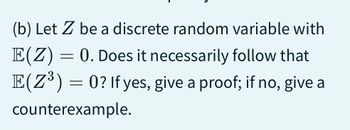
A First Course in Probability (10th Edition)
10th Edition
ISBN: 9780134753119
Author: Sheldon Ross
Publisher: PEARSON
expand_more
expand_more
format_list_bulleted
Question

Transcribed Image Text:(b) Let Z be a discrete random variable with
E(Z) = 0. Does it necessarily follow that
E(Z³) = 0? If yes, give a proof; if no, give a
counterexample.
Expert Solution
This question has been solved!
Explore an expertly crafted, step-by-step solution for a thorough understanding of key concepts.
Step by stepSolved in 2 steps

Knowledge Booster
Similar questions
- Let Y be a discrete random variable with generating function 4 Gy (s) 6 - s What is E(Y) (in decimal)? Answer:arrow_forwardSuppose that Y is an exponential random variable with λ = 4. Find. P[Y > (E(Y) + 2√√Var(Y))] . (round to 4 decimal points)arrow_forwardIf X and Y are Gaussian random variables then what is E[XY]?arrow_forward
arrow_back_ios
arrow_forward_ios
Recommended textbooks for you
 A First Course in Probability (10th Edition)ProbabilityISBN:9780134753119Author:Sheldon RossPublisher:PEARSON
A First Course in Probability (10th Edition)ProbabilityISBN:9780134753119Author:Sheldon RossPublisher:PEARSON

A First Course in Probability (10th Edition)
Probability
ISBN:9780134753119
Author:Sheldon Ross
Publisher:PEARSON
